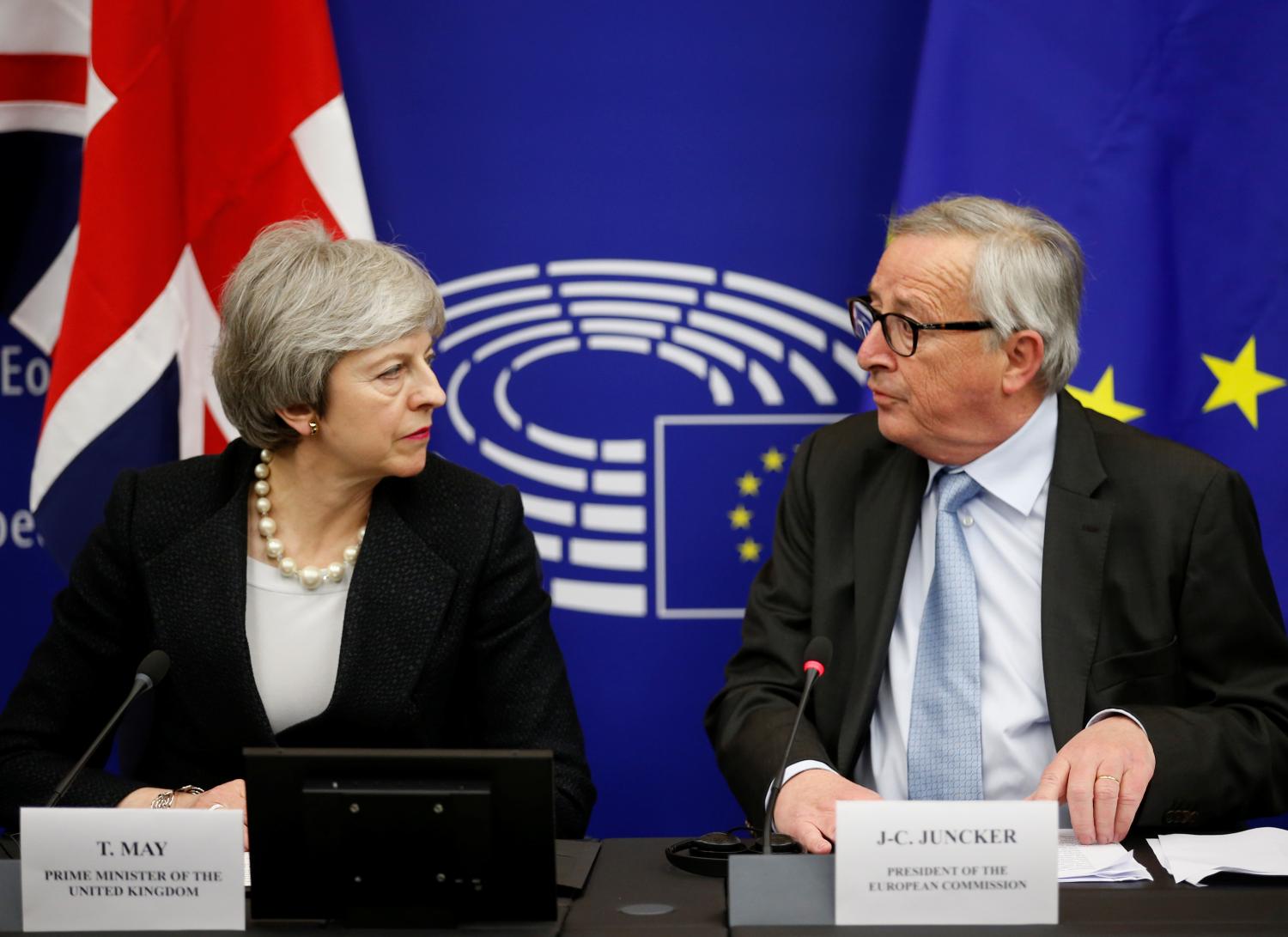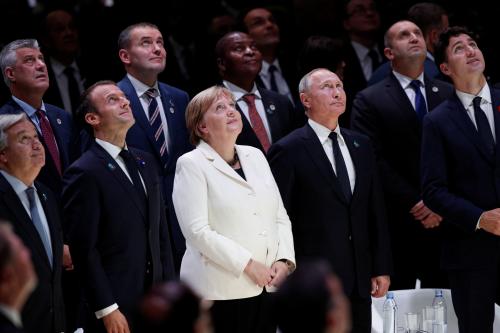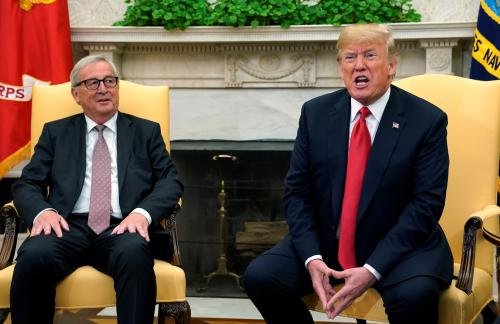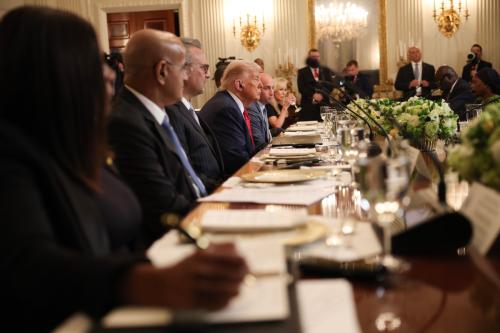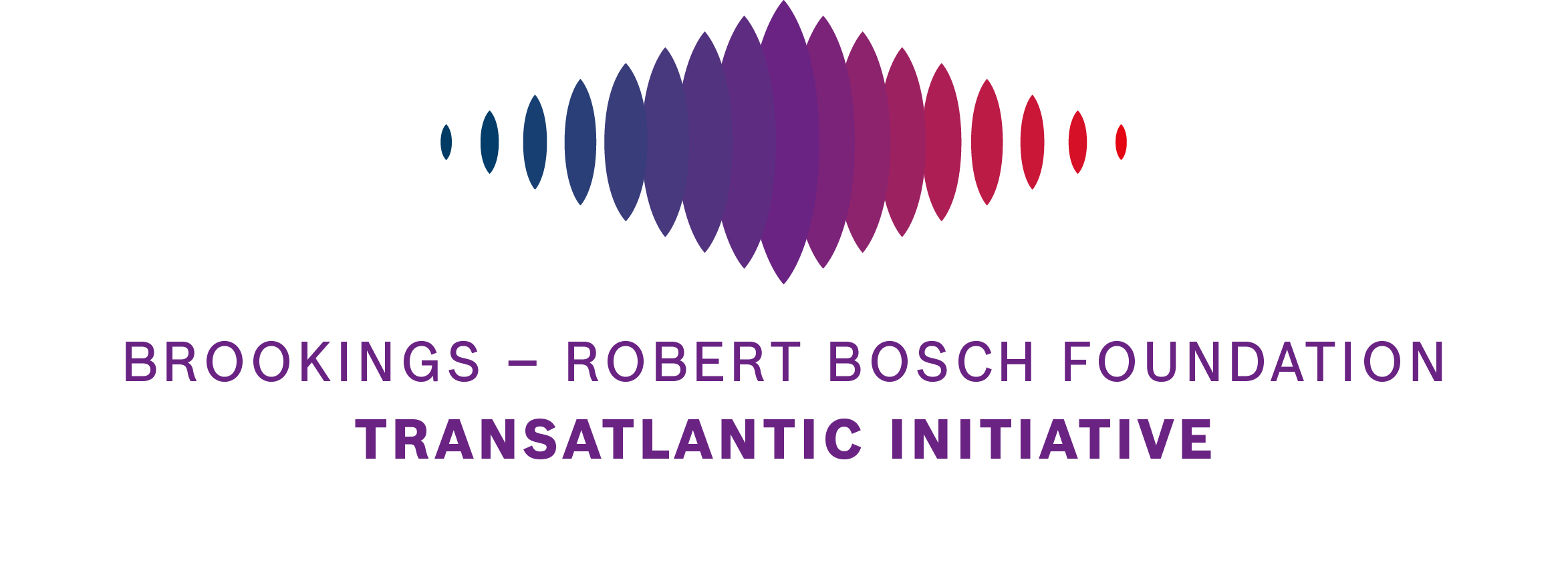 Welcome to the third edition of the Trans-Atlantic Scorecard, a quarterly evaluation of U.S.-European relations produced by Brookings’s Center on the United States and Europe (CUSE), as part of the Brookings – Robert Bosch Foundation Transatlantic Initiative. To produce the Scorecard, we poll Brookings scholars and other experts on the present state of U.S. relations with Europe—overall and in the political, security, and economic dimensions—as well as on the state of U.S. relations with five key countries and the European Union itself. We also ask about several major issues in the news. The poll for this edition of the survey was conducted April 5-9, 2019. The experts’ analysis is complemented by a Snapshot of the relationship over the previous three calendar months, including a timeline of significant moments, a tracker of President Trump’s telephone conversations with European leaders, figures presenting data relevant to the relationship, and CUSE Director Thomas Wright’s take on what to watch in the coming months.
Welcome to the third edition of the Trans-Atlantic Scorecard, a quarterly evaluation of U.S.-European relations produced by Brookings’s Center on the United States and Europe (CUSE), as part of the Brookings – Robert Bosch Foundation Transatlantic Initiative. To produce the Scorecard, we poll Brookings scholars and other experts on the present state of U.S. relations with Europe—overall and in the political, security, and economic dimensions—as well as on the state of U.S. relations with five key countries and the European Union itself. We also ask about several major issues in the news. The poll for this edition of the survey was conducted April 5-9, 2019. The experts’ analysis is complemented by a Snapshot of the relationship over the previous three calendar months, including a timeline of significant moments, a tracker of President Trump’s telephone conversations with European leaders, figures presenting data relevant to the relationship, and CUSE Director Thomas Wright’s take on what to watch in the coming months.
Snapshot
Timeline
- January 8
- Deutsche Welle reported that the Trump administration had downgraded the diplomatic status of the EU’s ambassador to the United States last fall, moving him below national ambassadors in the official order of precedence without notification. The leadership of the European Parliament’s Delegation for Relations with the United States of America responded with a letter to the U.S. Congress raising concerns about the “increasingly harmful approach from the White House when it comes to Transatlantic relations.”
- January 15
- The U.K. Parliament voted on Prime Minister May’s Brexit deal with the European Union after a month’s delay. It was defeated by a margin of 230 votes, the largest parliamentary defeat for a British government since World War I. With Britain long scheduled to leave the EU on March 29, the defeat raised the possibility of a no-deal Brexit as the default option.
- January 15
- President Macron launched his “Great National Debate,” a three-month series of public engagements for voters to express their concerns and ideas following months of anti-government protests connected to the “Gilets Jaunes” movement.
- January 16
- Prime Minister May survived a vote of no confidence called by Labour Party leader Jeremy Corbyn, with the U.K. Parliament rejecting it by 325 votes to 306.
- January 17
- The European Parliament voted by a margin of 397 to 158 in favor of the European Commission’s proposal to cut EU funds to countries that do not uphold the rule of law. Viewed as a way to exert pressure on countries like Hungary and Poland, the vote proceeded largely along geographic lines, with Western European MEPs largely voting in favor and MEPs from Central and Eastern Europe voting against.
- January 18
- After over four months of deadlock following the October 2018 election, Sweden formed a new government under incumbent Prime Minister Stefan Löfven. With only 33 percent of the seats in the Riksdag, the minority government coalition between the Social Democrats and the Green Party is reliant on a confidence and supply arrangement with the Centre Party and the Liberals. The arrangement keeps the third-largest party, the right-wing nationalist Swedish Democrats, out of power.
- January 23
- In a speech at Davos, Chancellor Merkel spoke out in favor of a multilateral order “that gives good answers to the challenges of tomorrow,” yet stressed that the “global architecture will only work if all of us are willing and ready for compromise.”
- January 24
- U.S. Vice President Mike Pence met with U.K. Foreign Secretary Jeremy Hunt in Washington to discuss bilateral trade after Brexit, Venezuela, Syria, and Yemen.
- January 25
- The Greek parliament ratified the Prespa Agreement with a slim majority of 153 to 147., The deal changes the long-disputed name of Greece’s northern neighbor to the Republic of North Macedonia, clearing a path for the country to join NATO and potentially in time the EU.
- January 31
- In a joint declaration, the foreign ministers of France, Germany, and the United Kingdom announced the establishment of the EU’s “special purpose vehicle” for trade with Iran, the Instrument in Support of Trade Exchanges (INSTEX), based in Paris. The move was symbolic of the EU’s continued commitment to upholding the JCPOA despite the U.S. withdrawal.
- February 5
- Italian Deputy Prime Minister Luigi Di Maio met with leaders of “Gilets Jaunes” movement outside of Paris, enflaming Italian-French relations. Two days later, France recalled its ambassador to Italy for the first time since World War II.
- February 6
- Skopje signed the Accession Protocol to join NATO. Two days later, the Greek parliament ratified the protocol, the first NATO member state to do so.
- February 13
- The United States and Poland co-hosted the “Ministerial To Promote a Future of Peace and Security in the Middle East” in Warsaw with representatives from 62 countries. The meeting was widely seen as targeted at Iran, and the EU, France, and Germany sent lower level representation. U.S. Secretary of State Mike Pompeo visited Hungary and Slovakia before the meeting, met EU High Representative for Foreign Affairs and Security Policy Federica Mogherini in Brussels after the meeting, and concluded his trip with a stop in Iceland.
- February 13
- U.S. Acting Secretary of Defense Patrick M. Shanahan attended a NATO defense ministerial in Brussels on his first international trip as acting secretary, following stops in Afghanistan and Iraq. He subsequently attended the Munich Security Conference.
- February 15
- President Trump nominated David Satterfield to be ambassador to Turkey, a position vacant since October 2017. Satterfield has served as Acting Assistant Secretary of State for Near Eastern Affairs since September 2017.
- February 15
- U.S. Assistant Secretary of State for European and Eurasian Affairs A. Wess Mitchell left his position after 16 months in office. He cited personal and professional reasons for stepping down in a January 4 letter to Secretary of State Mike Pompeo.
- February 16
- On the second day of the Munich Security Conference, Chancellor Merkel delivered a speech in which she championed multilateralism and the rules-based international order. U.S. Vice President Mike Pence used his speech to press allies on defense spending, Nord Stream II, and “the threat posed by Huawei and other Chinese telecom companies.” The U.S. sent its largest congressional delegation to date, including Speaker of the House Nancy Pelosi.
- February 20
- President Trump met with Austrian Chancellor Sebastian Kurz at the White House.
- March 4
- President Macron published an op-ed laying out EU-level policy proposals and asking European citizens “to chart together the road to European renewal” ahead of European Parliament elections in May.
- March 7
- President Trump met with Czech Prime Minister Andrej Babiš at the White House.
- March 10
- Annegret Kramp-Karrenbauer, the head of the German Christian Democratic Union and Chancellor Angela Merkel’s likely successor, responded to Macron with her own proposals, contributing to a developing “Franco-German narrative” for the future of Europe.
- March 11
- The U.S. Congress issued a bipartisan invitation to NATO Secretary General Jens Stoltenberg to address a joint session ahead of NATO’s 70th anniversary next month.
- March 12
- In the “second meaningful vote” on Prime Minister May’s Brexit deal, despite “legal changes” to interpretations of the backstop agreed with European Commission President Jean-Claude Juncker, the U.K. Parliament rejected it by 391 votes to 242.
- March 13
- The U.K. Parliament voted to rule out leaving the European Union without a deal by margin of 321 to 278. However, the vote was non-binding on the government.
- March 14
- President Trump met with Irish Taoiseach Leo Varadkar at the White House as part of the Taoiseach’s annual St. Patrick’s Day trip to the United States.
- March 14
- The U.K. Parliament voted 412 to 202 for Prime Minister May to ask the EU for a delay of the planned March 29 exit from the union.
- March 18
- The Speaker of the U.K. Parliament, John Bercow, upended Prime Minister May’s plan to bring her Brexit deal to a third vote, citing a convention from 1604 in his ruling that a defeated motion could not be brought to another vote if it was “substantially the same” as before.
- March 18
- Philip T. Reeker, a career Foreign Service officer, became U.S. Acting Assistant Secretary of State for European and Eurasian Affairs.
- March 20
- Regulators in the European Commission ordered Google to pay a $1.7 billion anti-trust fine.
- March 20
- Prime Minister May formally asked EU leaders for a delay of the United Kingdom’s planned exit from the European Union, stipulating that she was “not prepared to delay Brexit any further” than June 30.
- March 20
- In an almost unanimous decision, the European People’s Party (EPP) voted to suspend the membership of Hungarian Prime Minister Viktor Orbán’s Fidesz party, withdrawing the party’s voting rights but stopping short of expulsion from the center-right European bloc.
- March 21
- The European Council agreed to postpone the U.K.’s exit date until May 22 on the condition that Prime Minister May’s Brexit deal was passed before the original March 29 deadline. If the U.K. Parliament failed to ratify May’s deal by then, London would have until April 12 to propose an alternative way forward or leave without a deal.
- March 23
- Italy’s government signed a memorandum to formally join China’s Belt and Road Initiative, making Italy the first EU and G7 country to do so.
- March 25
- British MPs voted to seize control of the Brexit process, making way for a series of “indicative votes” on a range of possible Brexit outcomes.
- March 26
- The European Parliament passed the EU Copyright Directive, with 348 MEPs in favor and 278 against. The final version of the reform included the controversial Article 11, which extended copyright protections to story links published by news aggregators, and Article 13, which held tech companies responsible for copyright violations in user-developed content.
- March 26
- President Macron, Chancellor Merkel, and European Commission President Jean-Claude Juncker met with Chinese President Xi Jinping in Paris.
- March 27
- The U.K. Parliament held a series of “indicative votes” on Brexit. All eight proposals failed to win a majority.
- March 27
- La République En Marche (LREM), the French centrist party formed by President Macron, announced its top 30 candidates for the upcoming European Parliament elections. Although President Macron’s push for transnational lists was denied by the European Parliament, LREM’s list included Italian former European affairs minister Sandro Gozi.
- March 28
- The German government opted to extend its ban on arms exports to Saudi Arabia – a decision taken after the murder of journalist Jamal Khashoggi – by another six months after weeks of disputes within the coalition government. The embargo had led to tensions with France, given Paris’s commitments to both deeper defense cooperation with Germany and arms contracts with Saudi Arabia.
- March 29
- Although Prime Minister May offered to resign if her Brexit deal was passed and allow another member to lead negotiations with the EU over the future relationship, MPs rejected her deal for a third time by a vote of 334 to 286. The result left Prime Minister May with roughly two weeks to develop alternative plans before the U.K. was set to crash out of the EU with no deal on April 12.
- March 30
- Political newcomer and activist Zuzana Čaputová was elected President of Slovakia in a run-off vote against European Commission Vice President Maroš Šefčovič, the candidate backed by the ruling party Smer-SD. Inspired to run in part due to the murder of journalist Jan Kuciak and his wife last year, Čaputová pledged to fight corruption and promote the rule of law in Slovakia.
- March 31
- In the first round of Ukrainian presidential elections, comedian and political outsider Volodymyr Zelensky won a plurality, taking 30 percent of the votes. Zelensky was set to face off against the incumbent Petro Poroshenko, who won 16 percent of the votes, in a run-off election on April 21.
- March 31
- In local elections in Turkey, the ruling Justice and Development Party (AK Party) lost control of the country’s two biggest cities, Istanbul and Ankara, to the Republican People’s Party (CHP). The AK Party challenged the narrow Istanbul results.
Europe on the line
Tracking President Trump’s reported phone conversations with European leaders.
Between January 1 and March 31, 2019, President Trump spoke on the phone with Turkish President Erdoğan twice (January 14, February 21), French President Macron once (January 7), and German Chancellor Merkel once (March 22). He last spoke on the phone with U.K. Prime Minister May on November 9, 2018 and with Russian President Putin on March 20, 2018.

We track Trump’s phone calls with the leaders of France, Germany, Russia, Turkey, and the United Kingdom, whether they have spoken or not, as well as other calls with European leaders of which we are aware. The White House stopped releasing readouts of the president’s calls with foreign leaders in July 2018. If we’ve missed a conversation, please give us a ring. Source: whitehouse.gov, elysee.fr, bundeskanzlerin.de, gov.uk, en.kremlin.ru, tccb.gov.tr/en, press reports.
Figures
U.S. presidential visits to Europe, 2009-2019
Over the last decade (plus a few weeks), 20 European countries have hosted a U.S. president. President Trump has visited nine European countries since taking office in January 2019, spending at least part of seven of his 11 international trips on the continent. President Obama visited at least one European country on 21 of his 52 international trips in office (10 of 25 in his first term, 11 of 27 in his second term), for a total of 18 European countries.
Many of these stops are not focused on bilateral relations with the host country, at least not exclusively. Trump attended a G20 summit in Germany, a G7 summit in Italy, two NATO summits in Belgium, and the World Economic Forum in Davos, Switzerland. He visited U.S. troops at Ramstein Air Base in Germany after visiting troops in Iraq. Finland hosted a summit between Trump and President Putin. Obama’s visits to Europe included five G8/G7 summits, four G20 summits, four NATO summits, two UN climate change conferences, and the Nobel Peace Prize ceremony. Leaders from neighboring third countries joined for presidential visits to the Czech Republic, Sweden, Estonia, and Poland, among others.
France, Germany, and the United Kingdom were the most visited countries, with Belgium, Italy, Poland, and the Vatican also receiving visits from both presidents. Obama visited France and Germany more than any other countries in the world at six times each; he visited Mexico and the United Kingdom five times each. Trump has made two visits each to five countries so far—Belgium, France, Germany, Italy (he visited twice on the same trip, going to Brussels between Rome and Sicily), and Vietnam. France is likely to pull ahead on Trump’s list as he is anticipated to visit twice more this year, for D-Day commemorations in June and the G7 summit in Biarritz in August.
Europe, Huawei, and 5G
Strategic competition with China has become a key stress point in the trans-Atlantic relationship. A particular flashpoint relates to the involvement of Chinese telecommunications companies Huawei and, to a lesser degree, ZTE in the development and rollout of European 5G wireless networks.
In the last few months, the United States has mounted an aggressive campaign to pressure the European Union to ban Huawei from its telecommunications infrastructure based on the concern that Chinese laws require Huawei to turn over information to the government. Europe has responded ambivalently, with the European Union on the one hand tasking member states to complete national security reviews of their 5G infrastructure by the end of June, but with many member states refusing to ban Huawei completely. The European Union’s response envisions “mitigating measures to address cybersecurity risks” being agreed upon by December 31, 2019.
U.S. calls to ban Huawei have prompted a number of public statements from its European partners. Eleven European countries have explicitly addressed the issue of banning Huawei and/or the broader relationship between 5G infrastructure and security. Although nine of these statements warn of the dangers that come with the exploitation of 5G infrastructure, not all of them register concern. Most notably, Slovak Prime Minister Peter Pellegrini has asserted that Huawei is not a security threat, while Austrian Transport Minister Norbert Hofer has not only refused to ban Huawei, but insisted that economic interests may play a role in the discussion surrounding a Huawei ban. Meanwhile, Germany, where security services have warned of the security risks posed by Huawei, has refused to explicitly ban the company from its 5G networks, but has also proposed new data security regulations that could challenge Huawei’s position in the German market. France has made similar moves, and the United Kingdom is considering a critical report by its Huawei oversight authority that found “serious and systematic defects in Huawei’s software engineering and cyber security competence.”
Viewed from a private sector perspective, European links to Huawei are extensive, but difficult to track. Of a total of 88 telecommunications providers surveyed across 32 European countries, 33 providers in 19 countries have tested small scale 5G networks in partnership with Huawei or ZTE as recently as 2018. 17 providers were found to be testing with another partner, while no testing information was found for a further 38 companies.
Huawei or ZTE have signed memoranda of understanding (MOU) with 18 telecommunications providers in 15 countries within our survey sample. Overall, 10 of these MOUs see Huawei participating in a country-wide rollout of 5G networks. Huawei has also signed MOUs directly with the Hungarian and Maltese governments to improve their broadband services and roll out 5G technology.
Methodology: Using data provided by the European 5G Observatory, combined with original sourcing and research, 5G testing and partnership information was compiled for companies across Europe for the period January 2018 onwards. Telecommunications providers were compiled and counted on a national basis, thus subsidiaries of the same company in different countries would count separately. Please consult the attached Excel file at the top left of the page for exact sourcing and more specific details. Blank entries in the file indicate places for which data could not be found for the chosen time period.
What to watch
Center on the United States and Europe Director Thomas Wright lays out events, issues, and potential developments to watch for in the months ahead.
I am delighted to share with you the third edition of the Trans-Atlantic Scorecard, a quarterly evaluation of U.S.-European relations produced by Brookings’s Center on the United States and Europe, as part of the Brookings – Robert Bosch Foundation Transatlantic Initiative.
This scorecard saw little change from the previous iteration in January 2019. We will be watching several things in the next few months that could shake things up dramatically.
Days after we completed this survey, the Trump administration announced that it will be lifting the waivers for the Helms-Burton Act. This decision has the effect of allowing American citizens who were dispossessed by the Castro regime to sue companies profiting from that dispossession through commercial operations in Cuba. In other words, European and Canadian companies operating in Cuba can be sued in American courts. The European Union has promised retaliatory measures if these cases are successful. The Helms-Burton disputed roiled trans-Atlantic relations two decades ago, and it promises to do the same again now, potentially jeopardizing cooperation on other matters.
In June, President Trump will visit France for the 75th anniversary of the D-Day landings. There are reports, as yet unconfirmed, that he will also make a state visit to the United Kingdom. Trump has had a fraught relationship with Prime Minister May because of his interventions in Britain’s domestic politics—over Brexit, over the government’s handling of terrorist attacks, and because of his retweeting of Britain’s far right. This visit will be fraught with risk given the uncertainty over May’s future and the continuing Brexit negotiations.
We will of course be closely watching the European Parliament elections in late May which could have a major impact on EU policy. Will the populists capitalize on discontent with the political establishment? And, how will the results affect the composition of the European Commission?
Finally, we will continue to closely look at U.S.-EU trade relations. In particular, we will be asking if a U.S. trade deal with China makes a trade war with the EU more or less likely.
Thank you for reading the Trans-Atlantic Scorecard.
Trans-Atlantic Scorecard maintained by Sam Denney, Filippos Letsas, and Ted Reinert. Additional research by Sarah Barth. Digital design and web development by Eric Abalahin, Yohann Paris, Rachel Slattery, and Cameron Zotter.
The Brookings Institution is committed to quality, independence, and impact.
We are supported by a diverse array of funders. In line with our values and policies, each Brookings publication represents the sole views of its author(s).
